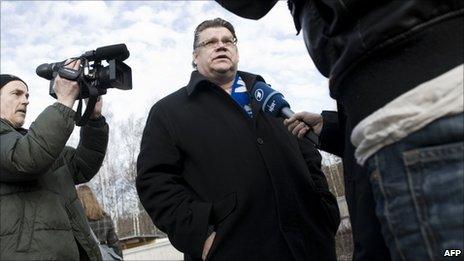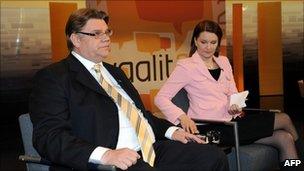Profile: Finland's Timo Soini
- Published

Timo Soini wore his football colours on election day 2011
Massive gains for a massive man - the nationalist True Finns' shock election result in the 2011 Finnish general election befits the burly figure of their leader, Timo Soini.
And there is much brain to go with the brawn, according to journalists who have followed his party's advance from the margins of politics - from just 4.1% of the vote in 2007 to about 19% four years later.
Brain, wit and charisma applied to a Euro-sceptic and nationalistic agenda - a potent mix worrying EU strategists who are mindful that Finland, unlike other eurozone states, has reserved the option of vetoing financial bail-outs.
"He draws a crowd like flypaper catches flies," one voter, who planned to keep her vote for the mainstream Social Democrats, told AFP news agency after watching him at the stump in the industrial town of Pori.
"He is a very good talker in a way that speaks to common people and makes complicated things look very easy," according to Jan Sundberg, a professor at Helsinki University.
If he has the common touch, he is also very much his own man, a die-hard supporter of unfashionable English football club Millwall and a convert to Roman Catholicism - he was reportedly inspired by a nun in the Irish Republic - in a country where Catholics make up less than 1% of the mainly Lutheran population.
Euro-sceptic

Mr Soini (left) debated with Centre Party leader and prime minister Mari Kiviniemi before the vote
In fact, in an interview for the Irish Times, external, he said he had "every sympathy" for the Irish over their bail-out, explaining that his opposition to it stemmed from a situation "where the IMF and EU come... and tell you what to do".
His vision for the EU is to return it to the form of a free trade union, without the eurozone. Unless and until that happens, the MEP, external likes to quip: "Where there is EU, there is a problem."
Inside Finland, he portrays himself as the friend of the common man, leading a party which emerged from the late Veikko Vennamo's Finnish Rural Party (SMP), which campaigned to improve the lives of labourers and small farmers.
An SMP member from the age of 16 (he is now 48), Mr Soini promotes plain living.
Married with two children, he has resided in the same block of flats in Espoo, a city near Helsinki, since 1968, Reuters news agency reports.
On the election trail, his down-to-earth charisma is infectious. In Pori he was swamped by people who came up to appreciatively thump him on the back or grab his hand and share stories of working class hardship.
His oratory is said to be both striking and funny. Mocking the Finnish government in 2007 for proposing to build new nuclear reactors as a response to climate change, he memorably quipped: "They are as excited as a baby is about his toes."
Dubious company
Liberals portray Mr Soini as xenophobic, accusing his party of beating a drum over immigration.
Ultra-nationalists are said to have infiltrated the True Finns, with a number of the party's candidates drawn from Suomen Sisu, a group which declares on its website that "different ethnicities should not be intentionally mixed" in the name of multiculturalism.
Mr Soini has played down this section of the party as being "10 men who are well organised" though he admits that some of his party's members are "politically incorrect".
In the European Parliament, the True Finns form part of Europe of Freedom and Democracy, a Euro-sceptic group which includes parties such as the UK Independence Party but also Italy's anti-immigration Northern League.
The AFP correspondent who watched him in Pori two days before the 2011 election noted that during five hours of campaigning, immigration was never mentioned.
"These people are asking about pensions, about work, about this European Union crisis and really down-to-earth issues," Mr Soini said afterwards.
"Nobody is asking about asylum-seekers."
Analysts suggest that whatever the True Finns leader's true feelings about immigration, he is careful not to frighten away voters by appearing extremist.
Whether it is his charisma or his controversial policies that clinch the votes is a matter of debate but one thing is clear, Timo Soini has landed on the European political landscape.
- Published18 April 2011